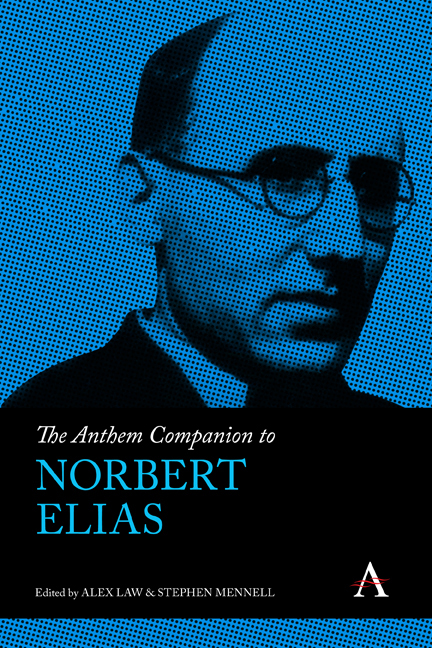Book contents
- Frontmatter
- Contents
- Notes On Contributors
- Acknowledgments
- Introduction: The Sociological Promise of Norbert Elias
- One Norbert Elias: Genesis of a Determined Thinker
- Two Knowledge, Science and Method: The Sociological Practice of Norbert Elias
- Three Norbert Elias’s Comparative Historical Sociology: Against Process Reduction
- Four Power and Process: Norbert Elias and the Paradox of Inequalities
- Five Norbert Elias and Shifting Gender Relations
- Six Travelling With Elias: Figurations and the Racialising Process in South Africa
- Seven Excitement Processes, Embodiment and Power Relations in Sport and Leisure
- Eight Warfare, Survival Units, National Habitus and Nationalism: Norbert Elias’s Contribution to Political Sociology
- Nine Elias’s Contribution to International Relations Theory: Towards a Global Sociology
- Ten Crime, Government and Civilisation: Rethinking Elias in Criminology
- Eleven Art and the Civilising Process
- Twelve From Social Mobility to Channels of Opportunity: Norbert Elias and Education
- Appendix: Published Works of Norbert Elias in English
- Index
Seven - Excitement Processes, Embodiment and Power Relations in Sport and Leisure
Published online by Cambridge University Press: 28 February 2024
- Frontmatter
- Contents
- Notes On Contributors
- Acknowledgments
- Introduction: The Sociological Promise of Norbert Elias
- One Norbert Elias: Genesis of a Determined Thinker
- Two Knowledge, Science and Method: The Sociological Practice of Norbert Elias
- Three Norbert Elias’s Comparative Historical Sociology: Against Process Reduction
- Four Power and Process: Norbert Elias and the Paradox of Inequalities
- Five Norbert Elias and Shifting Gender Relations
- Six Travelling With Elias: Figurations and the Racialising Process in South Africa
- Seven Excitement Processes, Embodiment and Power Relations in Sport and Leisure
- Eight Warfare, Survival Units, National Habitus and Nationalism: Norbert Elias’s Contribution to Political Sociology
- Nine Elias’s Contribution to International Relations Theory: Towards a Global Sociology
- Ten Crime, Government and Civilisation: Rethinking Elias in Criminology
- Eleven Art and the Civilising Process
- Twelve From Social Mobility to Channels of Opportunity: Norbert Elias and Education
- Appendix: Published Works of Norbert Elias in English
- Index
Summary
Introduction
Norbert Elias is recognised today as a major contributor to the development of the sociological tradition over the past century. This chapter introduces readers to the broad oeuvre of figurational research on sport and leisure, produced by Elias in collaboration with Eric Dunning in Quest for Excitement: Sport and Leisure in the Civilizing Process (Elias and Dunning 2008 [1986]). Matters of the human body and excitement processes were also outlined in Elias's (2009a) work on the sociology of knowledge where he eschewed the dichotomy between ‘body’ and ‘mind’. Here, we examine some of the creative seams in their work that have been taken up by successive generations. As we have noted elsewhere (for example, Liston 2011; Maguire 2005), there is now a 50-year corpus of figurational research on sport and leisure forms throughout the world. This has been ambitious in scope and precise in conceptual development: all the while being open to empirical verification and testing. Taken as a whole, it confirms Elias and Dunning’s (2008) basic contention that these phenomena could not be understood without reference to the overall social standards of conduct and sentiment because knowledge about sport and leisure was knowledge about society. To illustrate this, we outline the main ideas set out by Elias and Dunning on sport, leisure and the quest for excitement/exciting significance (Elias and Dunning 2008; Maguire 1992). This is a necessary precursor to appreciating the contribution of figurational work to understanding violence and sport and the social roots of football hooliganism conducted by the Leicester School. Thereafter we explore matters of identity, embodiment and power relations that are revealed in figurational research on medicine and health, and on gendered and national identities. Initially, we provide an overview of the theory of civilising processes as it applies to sport, leisure and the human body. This is important because ‘sociologist of sport’ is too limiting a descriptor for many of the researchers mentioned here, including Eric Dunning most notably.
Civilising Processes, the Body and the Quest for ‘Exciting Significance’
People do not just have an embodied self, a ‘body’: it is more correct to think of people's ‘bodies’ and ‘bodies of people’ as living formations of people acting out their lives in cultural and structural contexts.
- Type
- Chapter
- Information
- The Anthem Companion to Norbert Elias , pp. 129 - 148Publisher: Anthem PressPrint publication year: 2023



